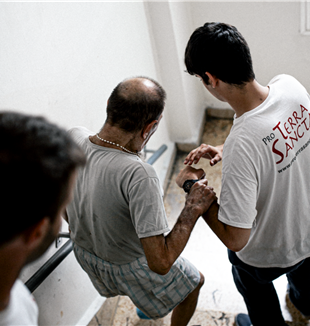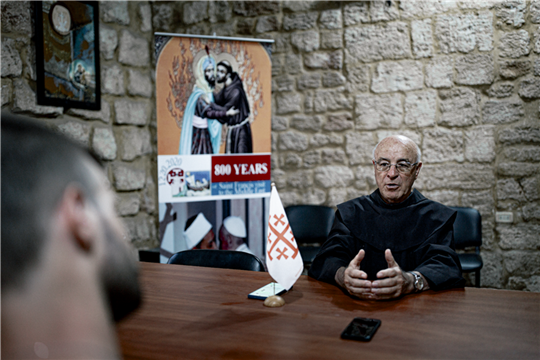
Lebanon: The art of building peace
The economic and political crisis and the threat of a new violent escalation. Yet at the Franciscan Convent in Tripoli, help continues to be offered to all. The report of the meeting a few weeks ago with Fr. Toufiq and Fr. Quirico.Revenge calls for revenge. A logical but irrational path because it has no way out. Yet the Middle Eastern powers seem to have begun to follow it: rockets are answered by explosions, the death of innocents by targeted attacks on the alleged perpetrators. A dangerous chain that could explode at any moment, involving an entire region that has always been in precarious equilibrium. It is a discouraging situation, even for those who, like us, a few weeks ago, before therefore the recent developments in the area, had the opportunity to visit Lebanon thanks to the Pro Terra Sancta Association, and were deeply impressed by the beauty of the places and the welcome of the people.
Meeting in the Patriarchate headquarters overlooking the Kadisha Valley, in whose caves Christians used to hide from Ottoman persecution, the Maronite deputy patriarch, Joseph Naffah, told us that “the Lebanese people are peaceful and do not want war; unfortunately, however, their history is marked by the meddling of other powers that over time have prevented the country from being united and living in peace. Faced with the threat of a new escalation, those words come back to mind, as do the days spent with those living in a country grappling with an unprecedented economic and political crisis, one of the highest inflation rates in the world, and no real government. During those two weeks spent in Lebanon, however, we witnessed first-hand how certainty and hope can inhabit every space and every circumstance.
The first thing that comes to mind when thinking back to those days are the eyes of Fr. Toufiq, a Franciscan from the Custody of the Holy Land, who told us about a bomb that exploded and destroyed the road he had just passed on his way to Deir Mimas, a town two kilometers from the Israeli border. In fact, Fr. Toufiq regularly takes food aid there and celebrates Mass for the 11 Christian families left in the epicenter of clashes between Tel Aviv and the Hezbollah military. "God protects us," he told us with shining eyes that revealed the origin of that peace.
The Custody has been rooted in Lebanon for more than 800 years, since the Franciscans were entrusted with the task of supporting the Christian communities present in the Holy Land. "Here, religious dialogue is not a choice but a given, a dimension of our daily life," summarizes Fr. Quirico, Superior of the Monastery of Tripoli, the country's second-largest port city after the capital Beirut. With a determined look, a rough character but capable of great laughter, ‘Abuna’ (which in Arabic means Our Father; that is what they call him) describes his life ever since he left his village in the province of Brindisi at the age of eighteen as a missionary: "A man is more ready to toil and sacrifice himself for the family he builds than for his family of origin. One is pushed to look at what is in the present, not at what has been.” The point is to give yourself totally in the place where you are today: "Only in this way," he continues, "can we discover God's plans for our lives.”
Fr. Quirico left for the Holy Land because he was fascinated by two Custody fathers he had met. It was from here that he found the strength to say goodbye to his family and, after his studies, to go to Nazareth, where he stayed for twenty-one years, and then to Acre for another eighteen. In 2016, the move to Lebanon, to Tripoli, where there had been no Custody Superior since 1975, when Civil War broke out in the Cedar Country.
Today, the Franciscan Convent in Tripoli has become a gathering place and a point of reference for those who live in the city. A summer camp is held during the summer in which children belonging to all creeds participate. "The only way we know the children's religion is to look at their parents. If their mothers are veiled or if they greet you with the expression ‘inshallah’ then they are of the Islamic faith, otherwise there is no difference," says Theresa, an art professor at the University of Tripoli who teaches a drawing course to the children who attend the center.
"When there are crises, spheres such as art and culture are usually the last to be valued; instead, we wanted them to be the first," Fr. Quirico says. This gave rise to the idea of creating the Tau Band, composed of Christian and Muslim young people who learn to play music together and perform on holidays. The same idea gave rise to the performance St. Francis and the Sultan: a play dedicated to the encounter between Christianity and Islam that ‘Abuna’ wrote with some friends and thanks to the support of the Custody. The result was the organization of four performances, two in Tripoli and two in Beirut. In particular,
on March 22, 2022, the day on which both Muslims and the Church celebrate the Feast of the Annunciation, Francis and the Sultan was performed at the Unesco headquarters in Lebanon. The event was an opportunity for members of the national government, who had not met for some time, to come together; and this is what the Franciscans wish to promote and support throughout the Holy Land: opportunities for meetings and dialogue that can, Fr. Quirico summed up, "make everyone discover the beauty of living together."
The conflicts that characterize Lebanon in Beirut are magnified even more. These days it is best to steer clear of the city's Shiite neighborhoods. The same is recommended regarding the Palestinian refugee camps located in the suburbs. The capital contains within itself the rifts that mark the entire country: in a few minutes one can see the port area, still scarred by the rubble of the great explosion of August 4, 2020; one then passes through the city's wealthy neighborhoods, where the cost of apartments is no less than in cities like Milan; and finally to the working-class areas where those who have nothing live. It is here that Pro Terra Sancta supports numerous people, often alone, who with the crisis have found themselves abandoned. Like Hayat and Joseph, husband and wife: before 2019 she worked in a school and he was a fruit vendor. When economic hardship set in and their health deteriorated, they both found themselves out of work, needing to buy medicines that are very highly priced. They have no children and live in a small house, dusty and full of crumpled photos that remind them of a life very different from their current one; as soon as you meet them they do nothing but thank God and Pro Terra Sancta for the help they receive. I was struck to see how Joseph's face changed as soon as we suggested that we go together to buy a pair of sandals. A smile appeared on his face revealing how his first need was not to be alone, to feel preferred.
In Beirut, Pro Terra Sancta also supports and promotes psychotherapeutic paths for the most fragile, helpless in front of the difficult situation their country is experiencing. Psychological sessions, music, dance and even theater classes. Difficult cases often arrive here, people suffocated by their own dramas who are unable to interact with anyone. Being with others, however, and seeing them open up and follow those who lead stirs something in even the most surrendered individuals, revealing that it is only possible to take a step with the strength of a shared trust and need.
Read also - "Our yes amid Syrian rubble"
Taking steps. One is reminded of that long procession formed by people from the Druze community who days ago accompanied the coffins of the twelve children mistakenly hit by a rocket while on the playground; a whole people who moved together because they were united in grief and disbelief at what had happened. A question then arose for me: what can help the Lebanese people, and the entire region, to make a real way forward? An unambiguous answer probably does not exist: the crisis remains deep, there are multiple causes and triggers that are largely difficult to identify, while society itself appears to be split into groups most often unable to relate to each other.
The deputy patriarch of the Maronites, Joseph Naffah is concerned on a daily basis to support his Church in a particularly complex social and political situation such as the current one. However, when it comes to the future of peace and hope for Lebanon, His Excellency does not dwell on political issues or the need for compromise: "We would not be Christians if we did not have hope even in such a complex situation." What about peace? "Jesus said that the Kingdom of God is in our hearts. Peace is not the outcome of a social calculation; instead, it is a treasure that each of us already possesses." It just needs to be recognized.